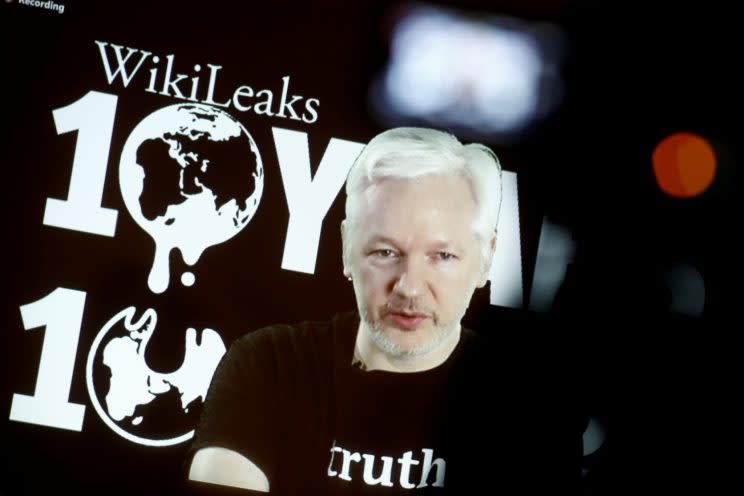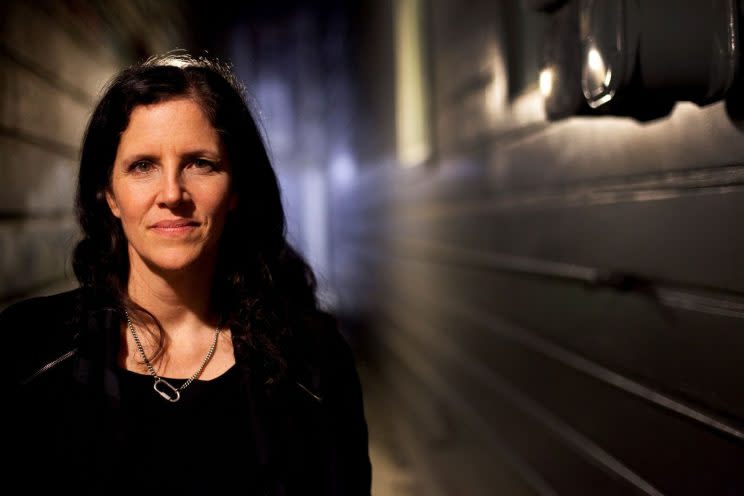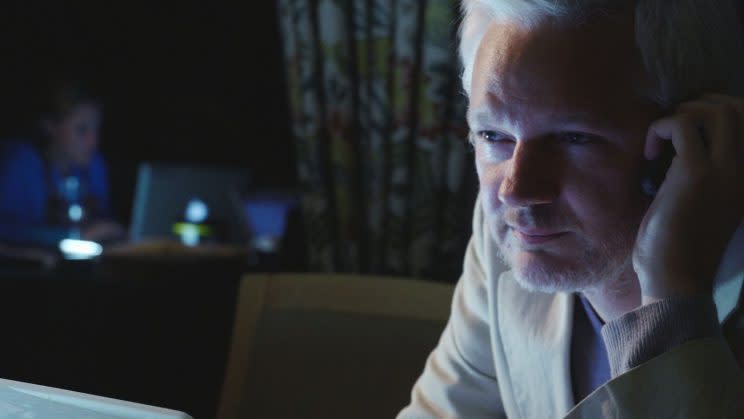‘Risk’ director discusses the ‘tragedy’ of Julian Assange and WikiLeaks

- Oops!Something went wrong.Please try again later.
- Oops!Something went wrong.Please try again later.
- Oops!Something went wrong.Please try again later.
- Oops!Something went wrong.Please try again later.
When documentary filmmaker Laura Poitras began work in 2011 on “Risk,” her portrait of WikiLeaks and its hugely controversial founder Julian Assange, the organization had spent months working with news outlets to publish stories based on more than 700,000 U.S. classified documents leaked by U.S. Army Pvt. Bradley Manning.
“It was so important to see publications that were exposing what was happening with U.S. foreign policy, which is something that I cared about and was working on in my own work,” Poitras, who had previously made documentaries on the American presence in Iraq and Guantanamo Bay, said in an interview with Yahoo News.
Poitras said that the documents from Manning — comprising U.S. diplomatic cables and war logs from Iraq and Afghanistan — “opened up a more adversarial chapter in journalism” after “a decade of failure to report what the U.S. government was doing.”
By the end of filming in early 2017, WikiLeaks looked very different from an upstart operation devoted to bringing to light the inner workings of American diplomacy and overseas military activities.
Over the course of six years, two leading members of WikiLeaks, including founder Julian Assange, were accused of sexual assault; Assange hosted a show on Russian state television from his self-imposed exile in Ecuador’s London embassy; rogue NSA contractor Edward Snowden provided reams of classified documents to Poitras and others before settling in Russia with the help of WikiLeaks; Manning entered prison after being convicted under the Espionage Act (she later received clemency from then President Barack Obama); Russian intelligence leveraged WikiLeaks in an influence operation to damage Hillary Clinton; CIA chief Mike Pompeo called Wikileaks a “hostile nonstate intelligence agency”; and Attorney General Jeff Sessions said that the U.S. would pursue criminal charges against Assange.
Poitras, who moved to Germany in 2012, acknowledges the increasing turmoil facing WikiLeaks and its enigmatic leader. But she is more concerned about the U.S. government’s reaction to WikiLeaks over the last six years.
“The film feels a bit like a tragedy, which unfolds over many years, beginning with maybe a moment of optimism and ending at a moment of more despair,” Poitras said. “And I think it encompasses that. And I don’t mean that to surround WikiLeaks or Julian, but politically where we fit today.”

“Risk” is an attempt by Poitras to present WikiLeaks’ actions as a noble endeavor, while also providing intimate portraits of the people behind the organization. As the film unfolds, the actions of the primary characters put the organization in a less flattering light.
“Risk” begins in 2011, with Assange attempting to reach then Secretary of State Clinton to inform her that 250,000 diplomatic cables were about to be published, unredacted, on the open Internet. Jacob Appelbaum, known as the “American WikiLeaks hacker,” is shown confronting Egyptian telecom officials over the blocking of Twitter during the Arab Spring. Poitras introduces the two men as heroes on the front lines of the government transparency movement.
Then Assange is accused of sexually assaulting two women in Sweden. He is shown telling lawyers that the charges are part of a radical feminist conspiracy. He adds that it would better if it were only one woman, as that would make it easier to pressure the accuser by impugning her character. Later in the film, Appelbaum is accused by former co-workers and acquaintances of sexual assault and bullying. The accusations led to Appelbaum being disowned by the privacy community. (Poitras notes that he denies any criminal conduct.)
Poitras acknowledges that she had to alter the story as the sex scandals tarnished the men behind WikiLeaks.
“I thought I could ignore the contradictions; I thought they were not part of the story,” she narrates as Assange is shown at a court hearing related to the sexual assault allegations. “I was wrong; they are becoming the story.” After the accusations against Appelbaum arose in June 2016 — weeks after “Risk” premiered at the Cannes Film Festival — Poitras adjusted the film further. “I had to address it. I couldn’t not address it,” Poitras told Yahoo News. “So it did shift the direction of the film.”
Nevertheless, Poitras’ insider’s view — including the revelation that she dated Appelbaum and he subsequently bullied someone close to her — did not sap her support for the cause.
“I didn’t want to pull punches but I also think that what WikiLeaks does is very important to journalism,” Poitras said. “I think that they publish information that is newsworthy and that is in the public interest. I don’t agree with all of their choices of what to publish, what not to publish, but I absolutely support their right to publish.”

The question of whether Assange practices journalism or a kind of guerrilla espionage under the guise of journalism has always been complicated. Guardian reporter Nick Davies, who worked with Assange on the Manning leaks, claimed that he did not care about redacting names of vulnerable sources listed in U.S. military documents: “I raised this with Julian and he said, ‘If an Afghan civilian helps coalition forces, he deserves to die.’ He went on to say that they have the status of a collaborator or an informant.”
Recently WikiLeaks has published classified documents, collectively called Vault 7, which detail CIA hacking tools down to the source code. Poitras, who published Snowden documents detailing NSA hacking tools, posited to Yahoo News that the Vault 7 leaks are in the public interest.
Amid the ongoing disclosures, American officials are increasingly questioning WikiLeaks’ motives. This week FBI Director James Comey, testifying to the Senate Judiciary Committee, argued that WikiLeaks published classified documents with the primary intention of damaging the U.S.
“To my mind, it crosses a line when it moves from being about trying to educate a public and instead just becomes about intelligence porn, frankly,” Comey said. “Just pushing out information about sources and methods without regard to interest, without regard to the First Amendment values that normally underlie press reporting. And simply becomes a conduit for the Russian intelligence services or some other adversary of the United States, just to push out information to damage the United States.”
Comey added: “And I realize, reasonable people as you said, struggle to draw a line. But surely … we can all agree there’s nothing that even smells journalistic about some of this conduct.”
But Poitras does not agree, and it’s not hard to see why. She, like WikiLeaks, drew the ire of the U.S. government through actions interpreted as adversarial. She co-founded the Freedom of the Press Foundation, which was created to raise money for WikiLeaks. She spent huge blocks of time with Assange and his inner circle. She asked Appelbaum, whom she met in the mid-2000s, for advice when she was dealing with an anonymous source that turned out to be Snowden and subsequently co-wrote articles with him based on the classified documents in Der Spiegel. Over the course of making “Risk,” she and WikiLeaks became intertwined.
Ultimately, the film and Poitras herself make clear that she is far too invested to admit that WikiLeaks has strayed from its ostensible mission.
Risk premieres in theaters on May 5.
Read more from Yahoo News:



